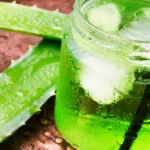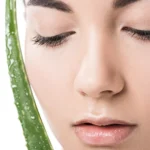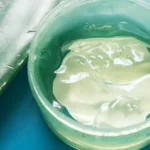The answer is yes. Aloe has been used for centuries to treat various ailments and illnesses, but today, it’s become famous for its health-promoting properties. It can be consumed in many ways – from juice or gel capsules to whole leaves – and offers numerous health benefits.
In this article, we’ll explore all things related to consuming aloe daily: why it’s beneficial, how much should be eaten each day, what forms are available, potential side effects, and more. We’ll also discuss some specific recipes that make incorporating aloe into your diet easy and delicious!
So, if you want information about adding aloe to your diet daily, look no further. This article will provide everything you need to make an informed choice about whether this superfood suits you.
Overview Of Aloe Vera
Aloe vera has long been revered for its health benefits, medicinal properties, and nutritional facts. With origins dating back to Ancient Egypt, aloe vera has remained a staple in many cultures worldwide. Mystically captivating with an air of mystery, let’s explore the nuances of this remarkable plant and why it remains popular today.
A naturally occurring succulent found mainly in warm climates like South Africa, Aloe Vera is composed of 95% water and provides essential vitamins such as A, C, E, and B12. In addition to being rich in fiber, calcium, and fatty acids, Aloe Vera contains compounds known for their anti-inflammatory effects on humans. It’s also packed with antioxidants, which help protect cells from damage caused by free radicals while boosting our immune systems.
From skincare products to digestive remedies, you can incorporate this superfood into your daily life in numerous ways! Not only will it positively impact your overall well-being, but it’ll also add a bit of variety to your routine. If you’re looking for something new or want to take control of your health journey, adding some aloe vera to your diet might be what you need right now!
Nutritional Benefits Of Aloe Vera
With its impressive nutritional profile, it’s no wonder that aloe vera is becoming more popular as a dietary supplement. Not only does it contain loads of vitamins and minerals, but it also offers antioxidant protection! Let’s take a closer look at the nutrient-dense benefits of this miraculous plant and how they can help you on your wellness journey.
Aloe Vera provides many essential nutrients – including Vitamins A, B12, C & E, crucial for healthy skin, hair, and nails. It also contains numerous minerals, such as calcium, magnesium, potassium, and zinc, supporting strong bones, teeth, and muscles. Furthermore, Aloe Vera contains polysaccharides like acemannan, which provide anti-inflammatory effects and dietary fiber that help keep your digestion running smoothly.
On top of providing essential vitamins and minerals, Aloe Vera is packed full of antioxidants, which act like an invisible shield against free radical damage from environmental factors like pollution or UV rays. By consuming these potent compounds daily through juices or supplements, you can protect yourself from oxidative stress while boosting your immune system! All in all, Aloe Vera is an incredibly nutritious snack choice that should make it into your diet plan soon!
Potential Side Effects
While aloe vera can be a powerful ally in promoting overall health, it’s essential to understand the potential side effects of consuming too much. It’s best to think about aloe vera as the spice on your plate rather than the main course – use it sparingly for maximum benefits and fewer risks! Here are three key areas you should be aware of:
1) Stomach cramps: While Aloe Vera has many digestive benefits, drinking large amounts could lead to stomach irritation or cramping due to its laxative properties. In some cases, this may also cause diarrhea symptoms.
2) Skin irritation: The saponins found in Aloe Vera can irritate sensitive skin if applied topically, so make sure to use with caution when applying any product containing this ingredient directly onto your face or body.
3) Blood sugar levels & lipid levels: Drinking excess aloe vera juice can influence blood sugar levels and lipids by reducing their concentrations in the bloodstream. Therefore, those with diabetes or high cholesterol should talk to their doctor before incorporating large amounts into their diet plan.
With all that being said, there is still no need to worry over small doses of aloe vera intake every day; instead, focus on using it as part of a balanced lifestyle full of nutritious foods and plenty of exercise. Aloe vera can provide excellent nutritional value when consumed responsibly while keeping our bodies healthy and happy!
Popular Uses For Aloe Vera
Considering its many health benefits, it’s no surprise that aloe vera is one of the most popular plants around! From promoting skin hydration to aiding digestion, here are a few of the top ways people use this versatile plant:
Skin Care: Aloe Vera contains antioxidants and antibacterial properties, making it great for moisturizing dry skin and treating acne scars and sunburned skin. It can also be used as an aftershave or facial cleanser when mixed with other ingredients like honey or coconut oil.
Digestive System: Drinking aloe vera juice on an empty stomach in the morning has been known to help reduce inflammation in the digestive tract while boosting metabolism. In addition, consuming smaller doses throughout the day may improve constipation symptoms by balancing out electrolyte levels.
Immune System: Due to its anti-inflammatory effects, aloe vera has been said to support immune system health and reduce oxidative stress from environmental toxins. Additionally, some studies have even suggested drinking aloe juice regularly could decrease risk factors associated with cancer development.
So many people turn to aloe vera for their everyday needs for numerous reasons! Whether you’re looking for a natural way to treat your skin or boost your overall well-being – including this particular plant in your routine may be the key ingredient you’ve been missing.
Dosing Guidelines For Aloe Vera
Understanding the appropriate dosing guidelines is critical when incorporating aloe vera into your daily routine. While this plant has numerous health benefits and uses, consuming or applying too much can lead to unwanted side effects. Here are a few tips for making sure you get just the right amount of aloe:
Know Your Intake Type: The suggested intake will vary greatly depending on your application (e.g., topical cream or juice). Before starting, ensure you understand how different applications affect dosage amounts so you can do it correctly!
Start With Smaller Doses: When introducing aloe vera into your diet, start with smaller doses and work up as necessary. This way, if any adverse reactions occur, they can be easily reversed – plus, it gives your body time to adjust!
If you need clarification on what type or how much of an aloe product is best for you, please talk to a doctor first who can give you personalized advice and recommendations based on your current medical condition(s).
By following these simple steps, you’ll enjoy all the excellent benefits of aloe without risking any potential harm. So please take some time to research and find out which form/dosage works best for you – then you can reap the rewards!
Types Of Aloe Vera Products Available
Various products are available to incorporate aloe vera into your daily routine. There’s something for everyone, from gel and juice to capsules and creams! Here’s a breakdown of the different kinds of aloe vera products you can find:
Aloe Vera Gel: The most common form of aloe vera on the market is found in gel form. This clear, thick liquid has been extracted from the leaves or inner part of an aloe vera plant, so it contains all its healing properties. It is often used topically as a moisturizer or skin-healing agent but can also be consumed orally if desired.
Aloe Vera Juice: Aloe juice is made by blending pieces of aloe vera plant with water, resulting in a more diluted extract than gel. While this type isn’t recommended for topical use due to its thin consistency, consuming it (with some added flavorings) can provide various health benefits, such as improved digestion and increased immunity.
Aloe Vera Capsules: If you’re considering convenience, look no further than aloe capsules! These tiny pills contain concentrated amounts of pure aloe vera extract, which have been dried and ground into powder – making them perfect for those who want to avoid sloshing around liquids or dealing with messy gels/juices.
No matter which type you choose, always buy high-quality products from reputable sources when possible. With these tips in mind, finding just the right aloe product should be easy peasy!
Interactions With Medications And Supplements
It’s no secret that aloe vera is a powerhouse of health benefits – but it can also have some pretty severe interactions with medications and supplements. To put it in simple terms, eating aloe, every could be like playing Russian roulette with your health! Let’s take a closer look at how drug and supplement-aloe interactions might affect you.
When it comes to drug-aloe interactions, things can get tricky quickly. Aloe may interfere with the absorption or effectiveness of certain medicines taken by mouth, such as antibiotics or diabetes drugs, so always consult your doctor before consuming if you are taking any medications regularly. Even topical aloe vera products should be used cautiously due to potential skin reactions caused by its active ingredients.
On the other hand, there is less data regarding aloe vera supplements and their effects on overall health; however, as with all dietary supplements, caution should still be exercised when taking them alongside prescribed medicines (or even over-the-counter remedies). It pays to speak with your pharmacist about possible side effects from supplementing with aloe before starting a new regimen.
In short, while many potential benefits are associated with using aloe products daily, you must be aware of the risks involved in combining these natural remedies with existing medications or supplements. Next, we’ll dive deeply into the dangers of overeating aloe daily – so buckle up!
Risks Associated With Eating Aloe Everyday
It may be tempting to think that eating aloe daily will give you the health benefits of this superfood. Still, it’s essential to recognize the risks involved in daily consumption. Firstly, too much natural aloe vera can cause an overdose of its active ingredients, which could have severe consequences for your health. Plus, if you’re taking medications or supplements while consuming high levels of aloe vera, it’s possible that they won’t interact well – resulting in either reduced effectiveness or increased side effects.
Despite being a natural remedy, even topical aloe vera products should be used sparingly due to potential skin reactions caused by its active components. Additionally, long-term use of these products may lead to other issues, such as dehydration and electrolyte imbalances – so proceed with caution when using them regularly!
Finally, some individuals are allergic to aloe vera products; you should always pay close attention to any signs of irritation after applying a topical or ingesting large amounts. In light of all these potential dangers associated with daily consumption of aloe vera goods and remedies, let’s explore alternatives for those looking for similar health benefits without the same risk profile.
Alternatives To Eating Aloe Everyday
Rather than consuming aloe every day, it may be best to take a moment and explore alternative options. Whether looking for natural substitutes or herbal remedies, plenty of other plant-based products can provide similar benefits without the same risks associated with high amounts of aloe vera consumption.
For instance, turmeric is an excellent substitute for those trying to avoid regular aloe consumption due to its anti-inflammatory effects. Similarly, chamomile tea has been used as an herbal remedy since the Middle Ages – thanks to its ability to soothe digestive discomfort.
These alternatives offer many potential health benefits while avoiding excessive amounts of aloe in your diet. Additionally, if you still want the unique properties found in aloe vera but want to reduce your risk profile – substituting topical creams and gels with diluted versions could help achieve this goal! Ultimately, it’s essential to remember that large quantities of products have inherent dangers. So, before you make drastic changes to your routine, please consult a medical professional who can safely guide you through these decisions.
When To Consult A Medical Professional
Ultimately, consuming aloe vera in excess can have serious consequences. Although many potential health benefits are associated with the plant, it’s essential to understand the risks and when you should seek medical advice before proceeding any further. To help navigate this complex topic, below is a list of key points to consider if you’re considering regularly taking large doses of aloe vera:
Aloe Vera Side Effects:
- Short-term symptoms such as nausea, vomiting, or diarrhea.
- Long-term effects like organ damage or liver failure.
- Hypoglycemia (low blood sugar) is due to its high content of polysaccharides, which can reduce glucose levels in the body.
- Long-Term Aloe Vera Usage:
- Potential for kidney stones from excessive consumption over time.
- Risk of developing colitis, an inflammatory bowel disease caused by long-term usage.
Aloe Vera Symptoms:
Abdominal cramps and pain after consuming large amounts.
Diarrhea that persists for more than 48 hours without improvement or resolution.
It’s essential to remember that everyone reacts differently to different dosages and supplements – so carefully monitoring your reactions and seeking professional advice whenever necessary is always recommended. If you experience any concerning side effects after beginning regular aloe vera consumption, please don’t hesitate to consult a medical professional who can assess your case and advise on how best to proceed safely while still enjoying the benefits of natural remedies like aloe vera!
Frequently Asked Questions
What Is The Shelf Life Of Aloe Vera Products?
We all know about the excellent benefits of aloe vera and how it can help us with our health and beauty routine. But have you ever stopped to consider its shelf life? Like many other products, aloe vera has an expiration date that we must pay attention to to ensure we get the most out of the product. In this article, let’s take a closer look at the shelf-life of aloe vera products and what factors influence their storage duration.
When storing aloe vera, there are several things to remember so that it lasts longer than its expiration date. For instance, temperature plays a crucial role; exposing your aloe vera products to too much heat or cold can cause them to expire faster than expected. Keeping them stored away from direct sunlight is also crucial, as UV rays tend to break down the active ingredients found within. When you purchase any aloe vera product, please be sure to check when it was produced so you can estimate its approximate expiration date.
It’s essential that once you purchase any aloe vera product, you store it properly so that you can enjoy its numerous benefits until it reaches its full potential. To ensure maximum freshness, always opt for airtight containers to prevent air and moisture from entering the package while keeping bugs out – no one wants pests crawling on their skincare! It’s also wise to keep old stock from new, as this could contaminate both items and potentially ruin their effectiveness.
Knowing the shelf-life of your favorite aloe vera products is essential for getting maximum value out of each item without worrying about expired dates or ruined ingredients due to poor storage conditions. With just a few extra steps and careful consideration regarding where and how these items are kept safe, anyone can reap the rewards of using natural remedies like aloe vera until everything dries!
Is Aloe Vera Safe For Children To Consume?
Aloe vera is a popular medicinal plant, with many people using it to treat skin conditions and other ailments. But when it comes to safety for children consuming aloe vera, some precautions must be taken. It’s essential to understand the risks of children consuming aloe vera before deciding on its use in their diets.
When considering aloe vera safety for children, understanding the potential benefits and side effects of consumption should be considered. The risk factors can vary greatly depending on how much aloe vera is consumed and under what circumstances. Here are five points explaining why extra caution should be taken:
Children may not have fully developed digestive systems, which could make them more susceptible to harmful ingredients found in certain types of aloe vera products.
Aloin, an ingredient in raw forms of aloe vera, has been known to cause severe abdominal cramps as well as diarrhea if ingested by young children.
Some studies suggest that long-term ingestion of aloe vera may lead to liver damage or kidney failure for anyone, regardless of age.
There is also evidence linking excess intake of aloin from eating large amounts of fresh aloe gel over time to cancerous tumors developing within the body.
While topical application is safe enough even for infants, ingesting too much while still growing can lead to complications later down the road.
Overall, it’s best practice to always check with your child’s pediatrician before allowing them to consume any form of aloe vera product – either topically or orally. The health professional will know all relevant information regarding the child’s current state and medical history so they can let them know appropriately whether these products suit their needs. That way, you won’t be concerned about your loved one’s well-being when deciding if consuming aloe vera is right for them, specifically given their unique situation.
Are There Any Health Benefits To Consuming Aloe Vera?
It’s no secret that aloe vera has been touted as a miracle cure for all sorts of ailments, from skin irritations to digestive issues. But how much truth is there behind these claims? Are there any real health benefits associated with consuming aloe vera? The answer may surprise you!
The scientific evidence regarding the potential health benefits of aloe vera consumption is surprisingly robust. Studies have shown that regular consumption of aloe vera can help improve digestion and reduce inflammation in the body. It also appears beneficial for controlling blood sugar levels, boosting immunity, and improving overall health.
But before we get too excited about adding aloe vera to our diets daily, it’s important to remember that moderation is essential for anything related to nutrition or supplementation. Consuming too much aloe vera could potentially cause an upset stomach or other adverse reactions; therefore, always consult your doctor before making changes to your diet or supplement routine. Reaping the full range of aloe vera benefits should involve incorporating small amounts into your everyday meals and snacks.
Informed decisions are essential when considering changing one’s dietary habits. Still, fortunately, those who decide to add some natural goodness by using this ancient medicinal plant will likely reap severe rewards for their efforts!
Is It Possible To Grow Aloe Vera Plants At Home?
Growing Aloe vera plants at home is an achievable goal for anyone looking to enjoy the many health benefits associated with this plant. Aloe vera can be propagated by cutting an existing plant or growing it in soil from seed. You can have your aloe vera garden with simple steps and primary care.
To start growing your aloe vera plants, could you decide whether you’d like to propagate cuttings from an existing mother plant or grow them in soil from seeds? Cuttings require more attention than planting seeds but will produce results faster. To begin propagation, use sharp scissors or pruners to cut off one of the leaves near the base of the stem. Remove prickly spines and allow them to dry for two days before placing them in a sandy loam potting mix about 2-3 inches deep. Water when needed and place in indirect sunlight until new roots form – usually around four weeks later. Once established, they can be moved into larger pots as desired.
If opting to grow aloe vera from seed instead, you’ll need a sterile container filled with moistened cactus/succulent mix combined with perlite and some well-draining soil medium such as sand or gravel. Place up to 5 seeds on top of the mixture and lightly press down so each seed has contact with the soil. Cover with plastic wrap and keep warm (between 70-85 degrees) until germination occurs, which could take 1-4 months, depending on conditions. Once sprouted, remove the plastic covering and continue following the instructions for watering and light exposure for propagating cuttings.
Aloe vera is an excellent addition to any home garden because it’s easy to maintain:
- Keep its potting mix damp but not soggy
- Make sure your plant gets plenty of bright natural light six hours minimum daily
- Fertilize every other month during the spring & summer seasons only
- Harvesting mature leaves after three months by cutting off the closest leaf to the center stalk
With minimal effort, your flourishing aloe vera collection will soon be ready for harvesting! Enjoy all these fantastic health benefits available right in your very own backyard!
Are There Any Recipes That Include Aloe Vera?
Are there any recipes that include aloe vera? Indeed, this succulent herb is highly versatile and can be used to create a variety of dishes. From salads to smoothies and curries to cocktails, aloe vera has made its way into numerous recipes with flavor and nutritional benefits.
Cooking with aloe vera is surprisingly simple, and the possibilities are almost endless. Creative cooks have devised various ways to incorporate it into their meals, like adding it to soups or creating unique side dishes such as grilled aloe vera wedges. For those looking for something sweet, aloe vera desserts such as ice cream, cake, cheesecake, and more abound online.
Whether you’re looking for savory or sweet recipes containing aloe vera, chances are good that you won’t be disappointed by what’s out there! It only takes a few minutes of research on the internet to find delicious ideas for incorporating this nutritious plant into your daily diet. So why not try some of these tasty aloe vera dishes today?
Main Takeaway:
Aloe vera can be a great addition to your daily diet if used correctly. With careful consideration of its shelf life, safety for children, and health benefits, consuming this plant regularly can help you achieve optimal wellness.
Growing aloe at home is possible and an easy way to ensure that you have a fresh supply of the gel whenever needed. Whether you make juice or jelly with it, plenty of recipes will show you how versatile aloe vera is. I enjoy using it in my smoothies – it adds unique texture and flavor!
Adding aloe to your diet may provide numerous health benefits if you don’t overdo it. While some people consume small amounts daily, others opt to have it once or twice a week. Ultimately, the choice is yours, so experiment with different ways of incorporating aloe vera into meals and snacks until you find what works best for your body.














